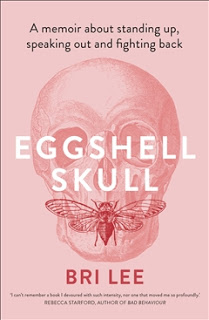‘Eggshell Skull’ Bri Lee
Reading Time: 3 minutes 
In her book, ‘Eggshell Skull’, Bri Lee offers something of interest to readers with divergent interests.
Those fascinated by courtroom drama will undoubtedly find the book impossible to put down, as Bri recounts criminal trial after criminal trial, from a Judge’s Associate’s perspective. (Judge’s Associates are high achieving law graduates who are hired to assist judges usually for a year, before being admitted to legal practice, and embarking on their legal careers.)
Bri’s accounts also provide an opportunity for readers to compare and contrast criminal cases in court as portrayed in literary and cinematic fiction, with real Australian hearings. Perhaps surprisingly, the reader is likely to find fact stranger and more interesting than fiction.
Those in legal academia and/or qualified to practice law but choosing not to do so (anymore), are likely to find many comments and events that will resonate. In this respect, Bri raises issues such as compulsory law subjects being geared towards the needs of the big end of town rather than the bread and butter areas relating to human beings and not corporations. The potentially desensitising effect of legal practice is also memorably displayed. Above all Bri persuasively questions whether our law and legal processes actually ensure that justice is done.

The main focus of the book, and undoubtedly the one that makes the greatest impact is sexual abuse of children and the abominably inadequate and often inappropriate avenues of legal redress available to victims.
The first reality that the book portrays is the prevalence of such charges in the workload of courts. In contrast, most of us probably labour under the impression that courts are only occasionally called upon to deal with child sexual assault cases.
The manner in which the law requires such charges to be redressed is a key theme of the book. One of the processes highlighted is the unpredictability of jury verdicts. It reminded me that when I worked in prosecution we considered our job done when the jury retired, and were never surprised by a jury’s verdict. The laughable myth that the jury is truly representative of the community is exposed over and over in this book. How the sequestration of juries and pervasive views as to juvenile sexuality stack the odds against a guilty verdict is set out, but the reader is left to draw his or her own conclusion. I wonder whether after reading this book, other readers will see merit in the suggestion that if given a choice between a jury trial and a trial by judge alone, you should opt for a trial by jury if you are guilty, but a trial before a judge if you are not guilty.
Gradually, the book makes us aware that Bri’s attitudes and troubled behaviour may flow from her own experiences as a child victim of sexual assault. After deciding to take her abuser to court, she embarks on the lengthy, stressful and frightening process – from lodging a complaint to testifying in court. In doing so, she succeeds in conveying the emotions and thinking as only a personal memoir can. Bri’s detailed outline of the process exposes the reader to the impact of not only the abuse, but also of the legal process on victims who seek justice. It does so in detail and with insight well beyond that able to be summed up in news reports. Ultimately the reader comes to understand why victims behave in ways that otherwise seem inexplicable.
Bri’s writing is such that you may find yourself hooked and unable to put the book down – not because it’s a light, jolly and entertaining read, but because it is so alarming, distressing and above all, real. But don’t let that put you off, as Bri’s writing is also fresh, witty and an absolute delight to read.
As for the book’s title, it refers to a legal principle that ‘you take your victims as you find them’. The principle has a number of applications. This book proposes a new application – quite distinct from the traditional, and much more assertive and inspirational.
As for the book’s title, it refers to a legal principle that ‘you take your victims as you find them’. The principle has a number of applications. This book proposes a new application – quite distinct from the traditional, and much more assertive and inspirational.
(Visited 53 times, 1 visits today)